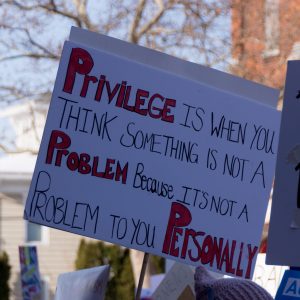A recent invitation to a powwow on a reserve north of Parry Sound provided a timely opportunity for representatives of six Toronto synagogues, as well as the Canadian Council for Reform Judaism (CCRJ), to connect with a First Nations community.
This year, both the CCRJ and the Bayview Corridor of Synagogues (BCS) – an interdenominational group of six congregations that collaborate for social action events – will focus on issues faced by First Nations communities.
Helen Poizner, past chair of social action at Temple Emanu-El, told The CJN that the BCS came up with the idea last winter after reading news about housing issues facing First Nations communities in northern Ontario.
Kim Wheatley – a traditional hand drummer and singer originally from the Shawanaga First Nation Reserve, an Anishinabe Ojibway community – performed at an awareness-raising event in February at Temple Emanu-El, and became the BCS’ resource person. At a subsequent event, she shared her perspective on water issues.
“My community spends over a million dollars a year purchasing water, and we’re 20 minutes north of Parry Sound,” she said in an interview. “We have water trucks that come to fill our reservoir, and we have to take an enormous amount of our budget to ensure we have water to drink, to bathe in, to cook. To me, that’s the most massive issue. We’re not far from the infrastructure of a big town.
“As a result of that [event], the concept of partnering came about,” said Wheatley, who is also interested in establishing a library on the reserve.
She extended the invitation to the Aug. 18-19 powwow, which gave the Jewish visitors “a first-hand idea of a different culture and a different way of life,” Poizner said.
Wheatley, who is aboriginal program co-ordinator at the Toronto Zoo, explained that powwows are open to anybody. “They’re public presentations and sharing. It’s just like a festival, except they have a sacred nature to them. They’re immersed with cultural teachings.”
In turn, Wheatley was invited to the Reform movement’s Camp George for Shabbat dinner and services, “which was amazing,” she said.
Rabbi Noam Katz – the dean of Jewish living at Camp George (which hosted two groups of First Nations youth this summer for activities and dialogue) and Leo Baeck Day School – said he was dazzled by some of the customs and traditions he witnessed at the powwow, and by having the chance to speak with Lakota elder Cliff Standingready. “I thought it was very inspiring.
“I realized there are so many points of intersection and commonality between aboriginal traditions and many of our own Jewish traditions… safeguarding the earth, respecting the elders and transmitting the old values and stories to the next generation.”
The CCRJ came into the picture when Poizner and Fran Isaacs, chair of Temple Har Zion’s social action committee, attended a meeting of the Reform movement’s national social action committee.
In addition to the two Reform congregations, the BCS also includes Beit Rayim Synagogue, Beth Tikvah Synagogue, Shaar Shalom Synagogue (all of which are Conservative), and Kehillat Shaarei Torah (which is Orthodox).
A total of almost 30 representatives of the two groups attended the powwow. Poizner and her husband Marty brought 50 backpacks filled with school supplies, donated by Ve’Ahavta, as gifts.
Among other ceremonies, there was an honour dance for the Jewish group to thank them for developing the partnership and bringing the gifts.
Wheatley recalls feeling “so pleased, so happy, so proud” at the powwow. “It was a great opportunity [for visitors] to experience who we are in a very fun and welcoming atmosphere.
“I think partnership between communities that are connected by their hearts is really important, and I think the grass roots level is the most important way to get anything done.”






